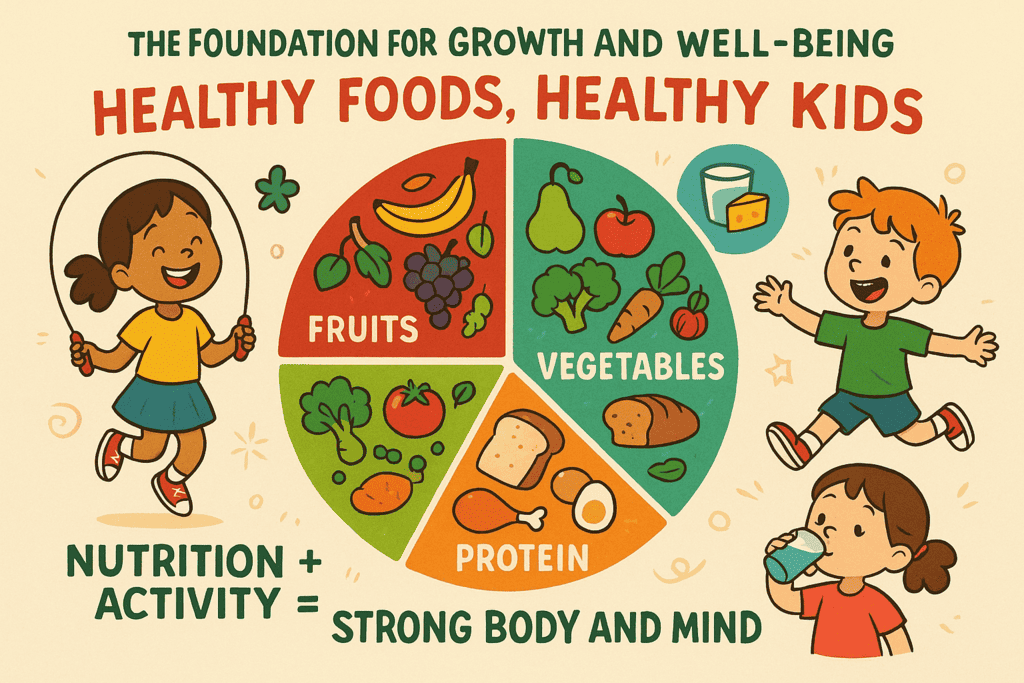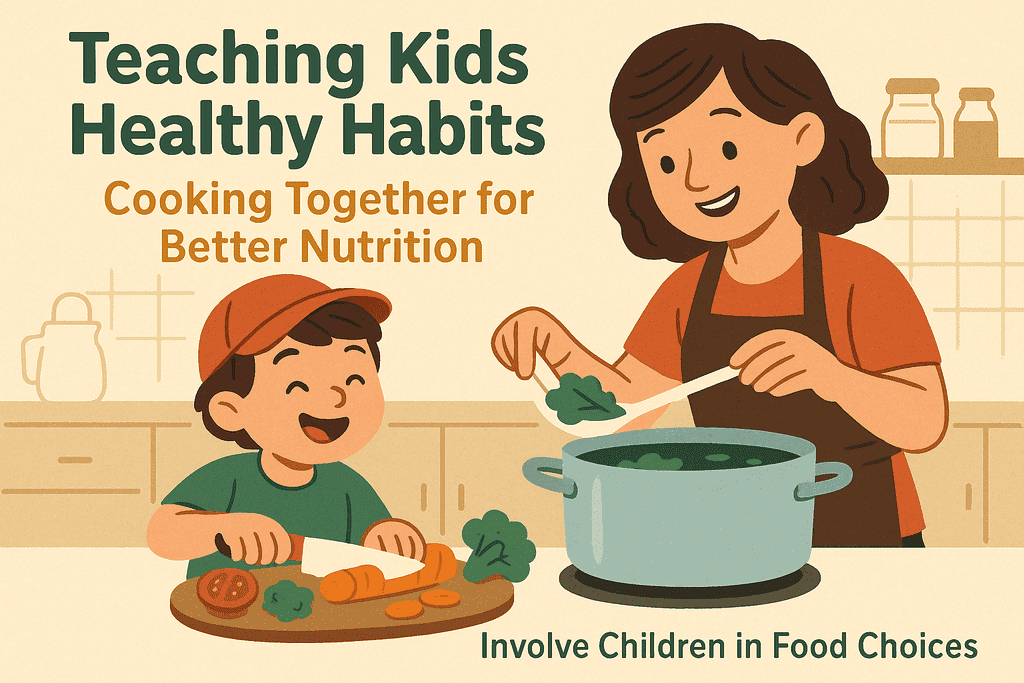
Introduction
In the intricate tapestry of childhood development, nutrition serves as the cornerstone upon which physical, cognitive, and emotional well-being are built. The significance of providing children with a balanced and nutrient-rich diet cannot be overstated, as it influences their growth trajectories, immune resilience, and overall quality of life. Recent global studies underscore a concerning trend: for the first time in history, the number of children affected by obesity has surpassed those who are underweight, highlighting the urgent need to reassess dietary patterns and nutritional policies worldwide Vox.

The Role of Nutrition in Child Development
Physical Growth and Immune Function
Adequate nutrition is pivotal during the first 1,000 days of a child’s life, encompassing the period from conception to the second birthday. This phase is critical for establishing a foundation for optimal growth and development. Nutrients such as proteins, fats, vitamins, and minerals play essential roles in cellular development, bone formation, and the maturation of the immune system. Deficiencies in these nutrients can lead to stunted growth, weakened immunity, and increased susceptibility to infections PMC.
Cognitive Development and Academic Performance
The brain’s development is intricately linked to nutritional intake. Essential fatty acids, particularly omega-3s, are integral to neural development and cognitive function. Studies have demonstrated that children who receive adequate nutrition exhibit enhanced memory, attention, and problem-solving skills, which are directly correlated with improved academic performance. Conversely, malnutrition during early childhood can lead to long-term deficits in learning abilities and behavioral issues CDC.
Emotional Well-being and Behavioral Health
Nutrition also impacts emotional regulation and mental health. Diets rich in fruits, vegetables, and whole grains have been associated with lower incidences of anxiety and depression among children. Conversely, high consumption of ultra-processed foods, laden with sugars and unhealthy fats, has been linked to an increased risk of mood disorders and behavioral problems. Establishing healthy eating habits early in life is crucial for fostering emotional resilience and psychological well-being ScienceDirect.
The Global Shift: Obesity Surpassing Undernutrition
A groundbreaking report by UNICEF reveals that, as of 2025, more children are obese than underweight—a stark reversal from 25 years ago. Approximately 188 million children aged 5–19 are now classified as obese, compared to 9.2% who are underweight. This alarming trend is attributed to increased consumption of ultra-processed foods (UPFs), characterized by high calorie content and low nutritional value, coupled with sedentary lifestyles Vox.

Key Nutrients Essential for Children’s Health
A balanced diet for children should encompass a variety of nutrients to support their multifaceted development:
- Proteins : Crucial for growth, tissue repair, and immune function.
- Carbohydrates : The primary energy source, vital for active play and learning.
- Fats : Essential for brain development and the absorption of fat-soluble vitamins.
- Vitamins and Minerals : Play roles in bone health (e.g., calcium, vitamin D), immune support (e.g., vitamin C, zinc), and overall cellular function.
- Fiber : Important for digestive health and maintaining a healthy weight.
Strategies to Promote Healthy Eating Habits
Parental Role and Modeling
Children often emulate the eating behaviors of their caregivers. Parents and guardians can encourage healthy eating by providing a variety of nutritious foods, demonstrating positive eating habits, and creating a pleasant mealtime environment. Avoiding the use of food as a reward or punishment can also foster a healthy relationship with food Université de Buffalo.
Educational Initiatives
Schools and communities play a pivotal role in shaping children’s dietary choices. Implementing nutrition education programs that teach children about the benefits of healthy eating and the risks associated with poor dietary habits can empower them to make informed food choices. Additionally, integrating nutrition into school curricula and promoting the availability of healthy food options in school cafeterias can reinforce positive dietary behaviors.
Policy Interventions
Governments can enact policies to create environments that support healthy eating. Measures such as regulating the marketing of unhealthy foods to children, implementing taxes on sugary beverages, and ensuring the availability of nutritious foods in schools and communities can significantly impact children’s dietary habits. Countries like Chile and Mexico have already implemented such policies with positive outcomes The Washington Post.

Conclusion
The foundation of a child’s health and well-being is intricately linked to the quality of their nutrition. As global trends indicate a shift towards increased childhood obesity, it becomes imperative to prioritize balanced, nutrient-rich diets and implement strategies that promote healthy eating habits. Through concerted efforts involving parents, educators, policymakers, and communities, we can ensure that children receive the nourishment they need to thrive physically, cognitively, and emotionally.
References
- UNICEF. (2025). Child Nutrition Report. Retrieved from https://www.unicef.org/reports/child-nutrition-report
- Centers for Disease Control and Prevention (CDC). (2024). Benefits of Healthy Eating for Children. Retrieved from https://www.cdc.gov/nutrition/php/resources/healthy-eating-benefits-for-children.html
- Healthy Eating Research. (2023). 2023 Research Highlights. Retrieved from https://healthyeatingresearch.org/2023/12/2023-research-highlights/
- Precious, F. K. (2023). Why nutrition programs for children remain important. ScienceDirect. Retrieved from https://www.sciencedirect.com/science/article/abs/pii/S2452263523000095
- Frongillo, E. A. (2024). Meta-review of child and adolescent experiences and consequences of food insecurity. ScienceDirect. Retrieved from https://www.sciencedirect.com/science/article/pii/S2211912424000294
- Murray, R. D. (2024). Protecting optimal childhood growth: systematic nutritional interventions. Frontiers in Nutrition. Retrieved from https://www.frontiersin.org/journals/nutrition/articles/10.3389/fnut.2024.1483234/full
- Charness, G. (2023). Improving children’s food choices: Experimental evidence from elementary schools. ScienceDirect. Retrieved from https://www.sciencedirect.com/science/article/pii/S0014292123001903
- Palandri, L. (2024). Investigating Eating Habits of Children Aged between 6 and 12 Years. PubMed Central. Retrieved from https://pmc.ncbi.nlm.nih.gov/articles/PMC10888164/
- World Health Organization (WHO). (2023). Child growth standards. Retrieved from https://www.emro.who.int/nutrition/resources/child-growth-standards.html
- United States Department of Agriculture (USDA). (2025). Food Security in the U.S. – Key Statistics & Graphics. Retrieved from https://www.ers.usda.gov/topics/food-nutrition-assistance/food-security-in-the-us/key-statistics-graphics





